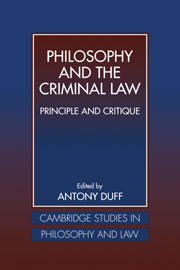Book contents
- Frontmatter
- Contents
- List of Contributors
- Introduction
- 1 Contingency, Coherence, and Conceptualism: Reflections on the Encounter between ‘Critique’ and ‘the Philosophy of the Criminal Law’
- 2 Does Criminal Liability Require an Act?
- 3 ‘Simulacra of Morality’? Beyond the Ideal/Actual Antinomies of Criminal Justice
- 4 Principle and Contradiction in the Criminal Law: Motives and Criminal Liability
- 5 On the General Part of the Criminal Law
- Index
2 - Does Criminal Liability Require an Act?
Published online by Cambridge University Press: 17 September 2009
- Frontmatter
- Contents
- List of Contributors
- Introduction
- 1 Contingency, Coherence, and Conceptualism: Reflections on the Encounter between ‘Critique’ and ‘the Philosophy of the Criminal Law’
- 2 Does Criminal Liability Require an Act?
- 3 ‘Simulacra of Morality’? Beyond the Ideal/Actual Antinomies of Criminal Justice
- 4 Principle and Contradiction in the Criminal Law: Motives and Criminal Liability
- 5 On the General Part of the Criminal Law
- Index
Summary
Does criminal liability require an act? Most legal philosophers apparently believe so. I am unpersuaded. My defense of a negative answer will begin with a clarification of the question itself. If my efforts to interpret this question are successful, I hope it will become relatively clear that criminal liability does not require an act. My conclusion, however, is not designed to support those critical theorists who maintain that the criminal law is unprincipled. I will argue that the considerations frequently advanced on behalf of the act requirement actually establish a somewhat different principle – which I will call the control requirement.
I am hopeful that the control requirement proves superior to the act requirement in helping to organize and understand the substantive criminal law. Critical theorists are likely to disagree; they question the rationality and coherence of such principles as I defend. Whether the control requirement should be accepted as rational and coherent depends on two factors. First, the implications of the control requirement must be tested against the general rules and doctrines of the criminal law. I begin this assessment here, although a great deal of work remains to be done. Second, critical theorists must be pressed to explain what they mean by coherence and rationality – the features that the criminal law is alleged to lack. I do not explore these latter issues.
- Type
- Chapter
- Information
- Philosophy and the Criminal LawPrinciple and Critique, pp. 60 - 100Publisher: Cambridge University PressPrint publication year: 1998
- 7
- Cited by



